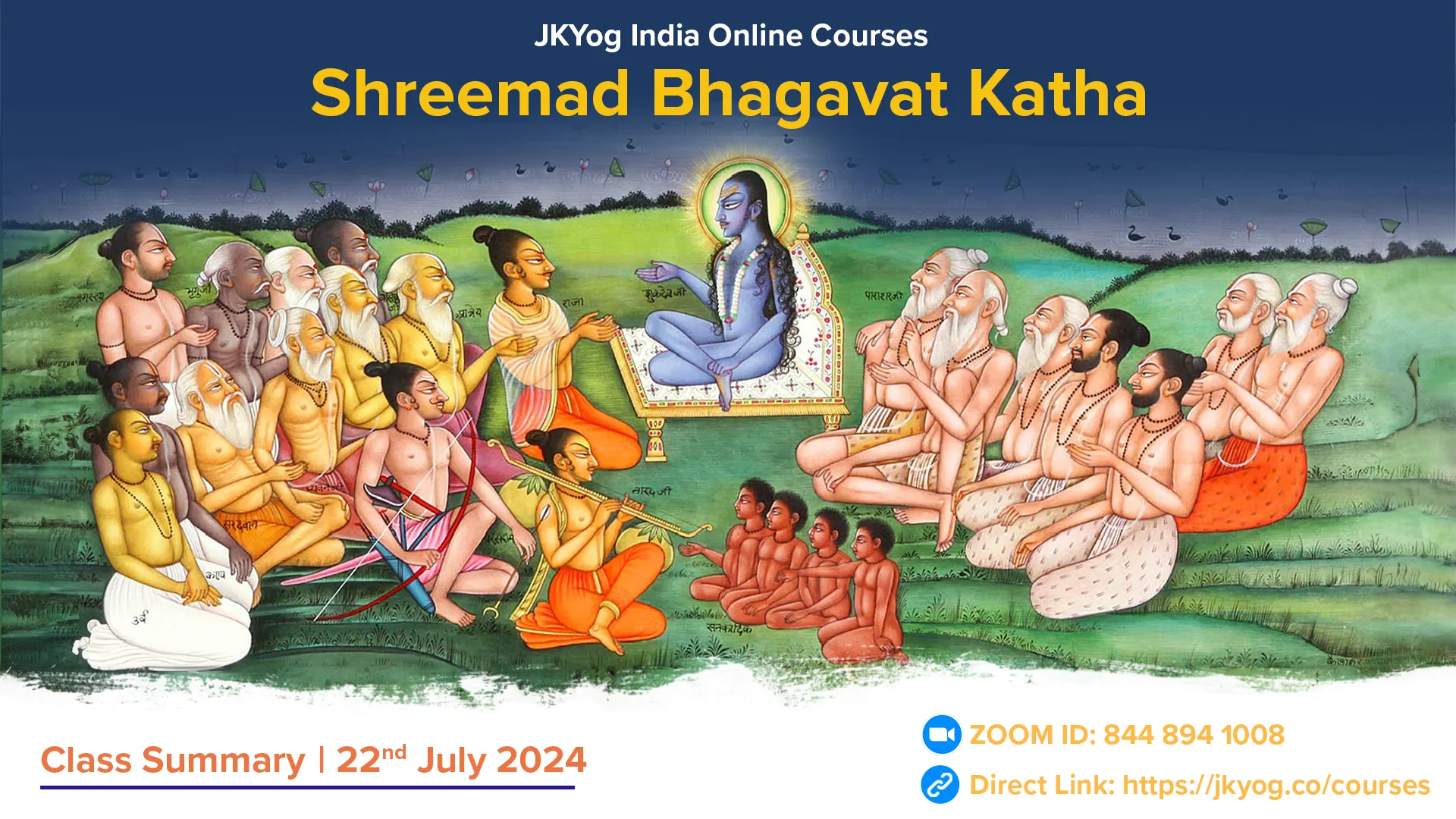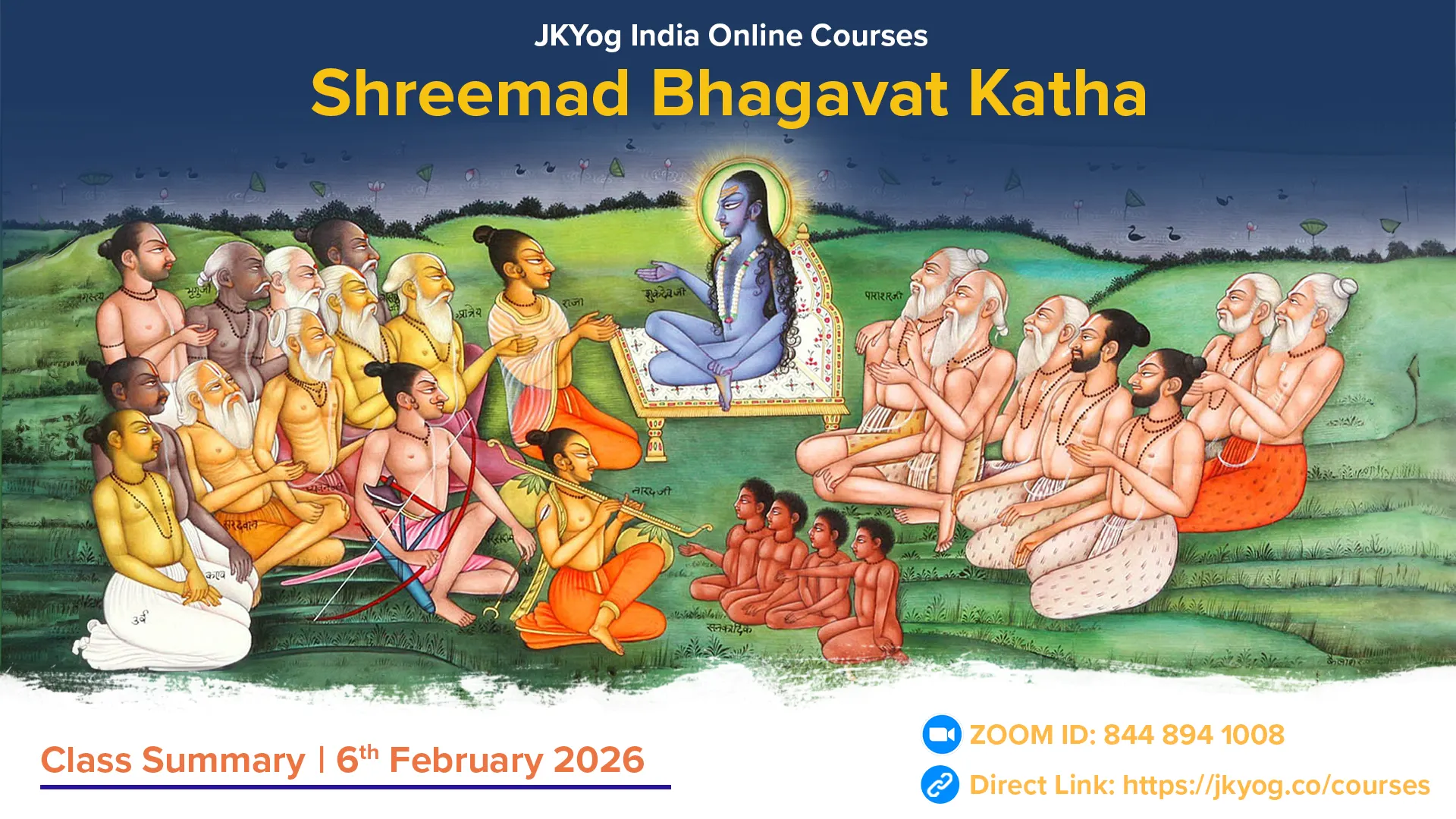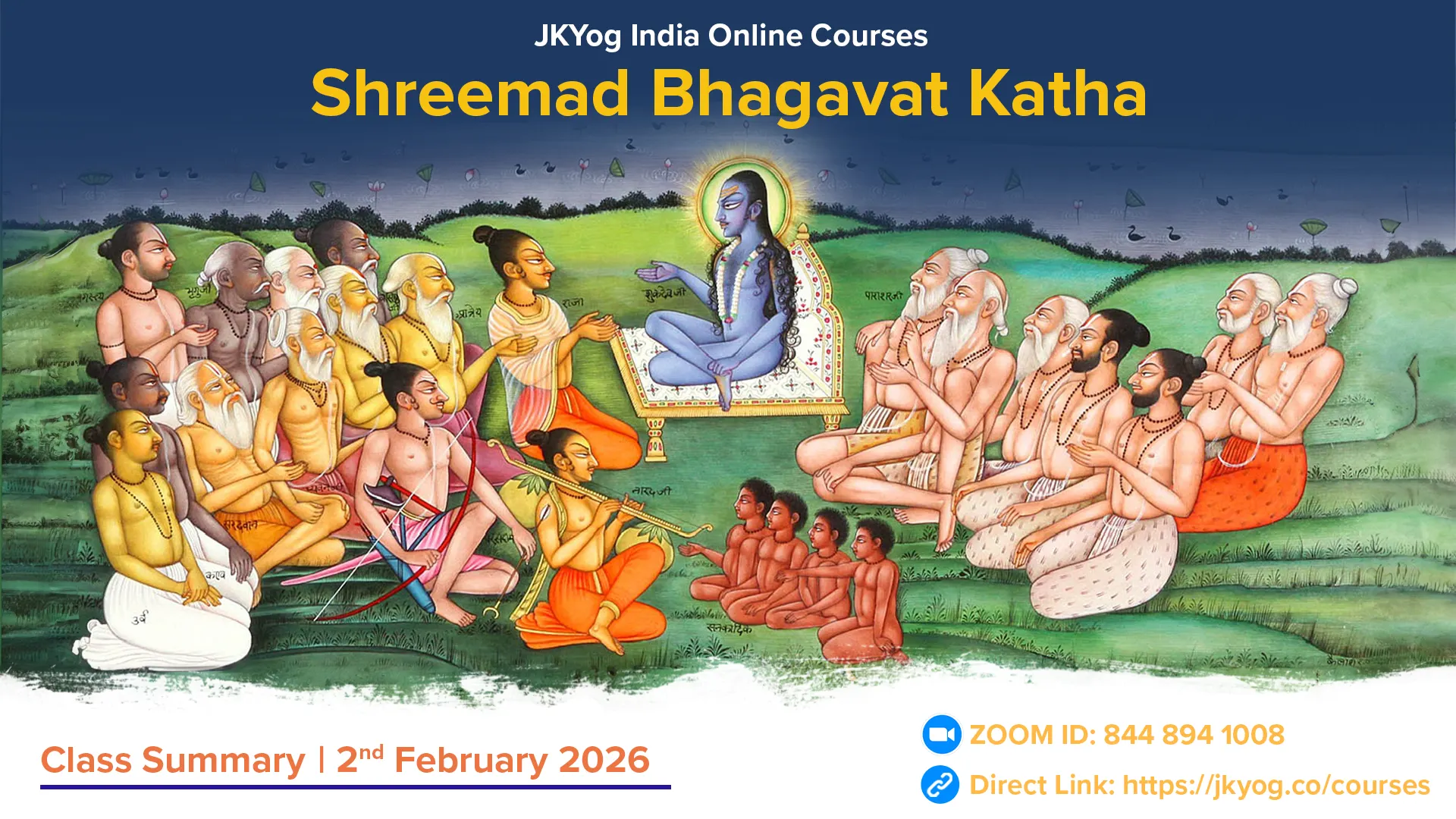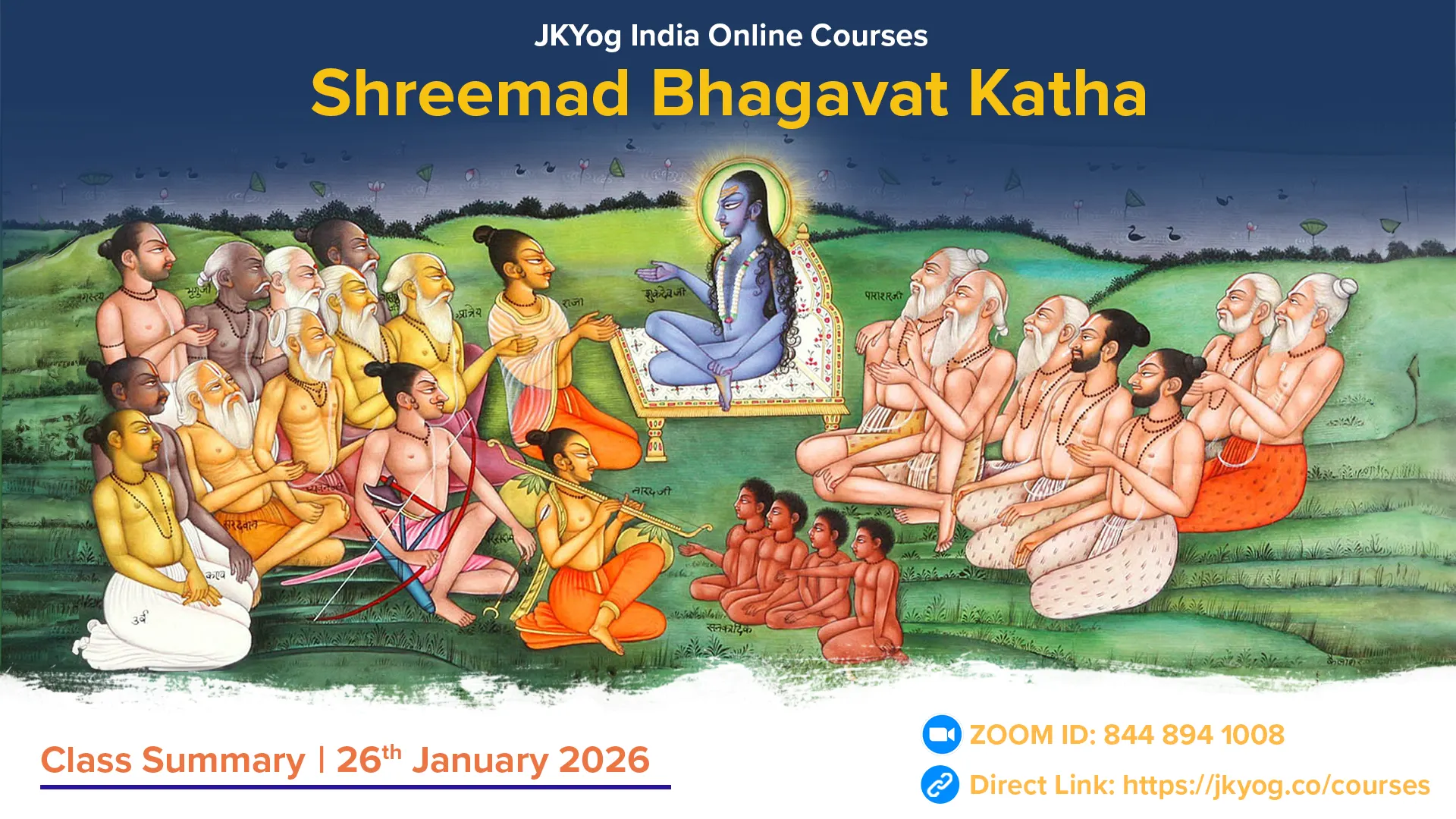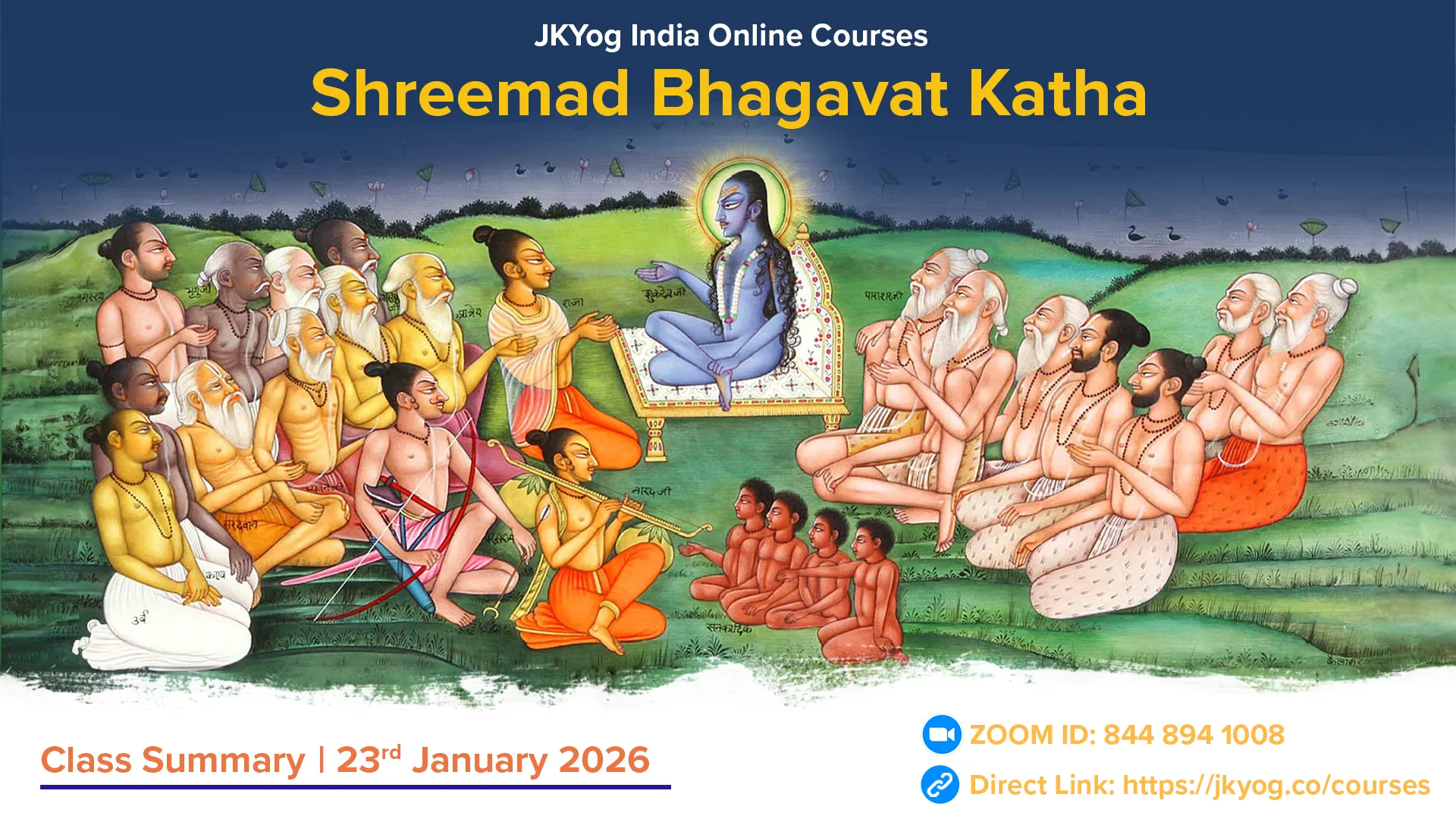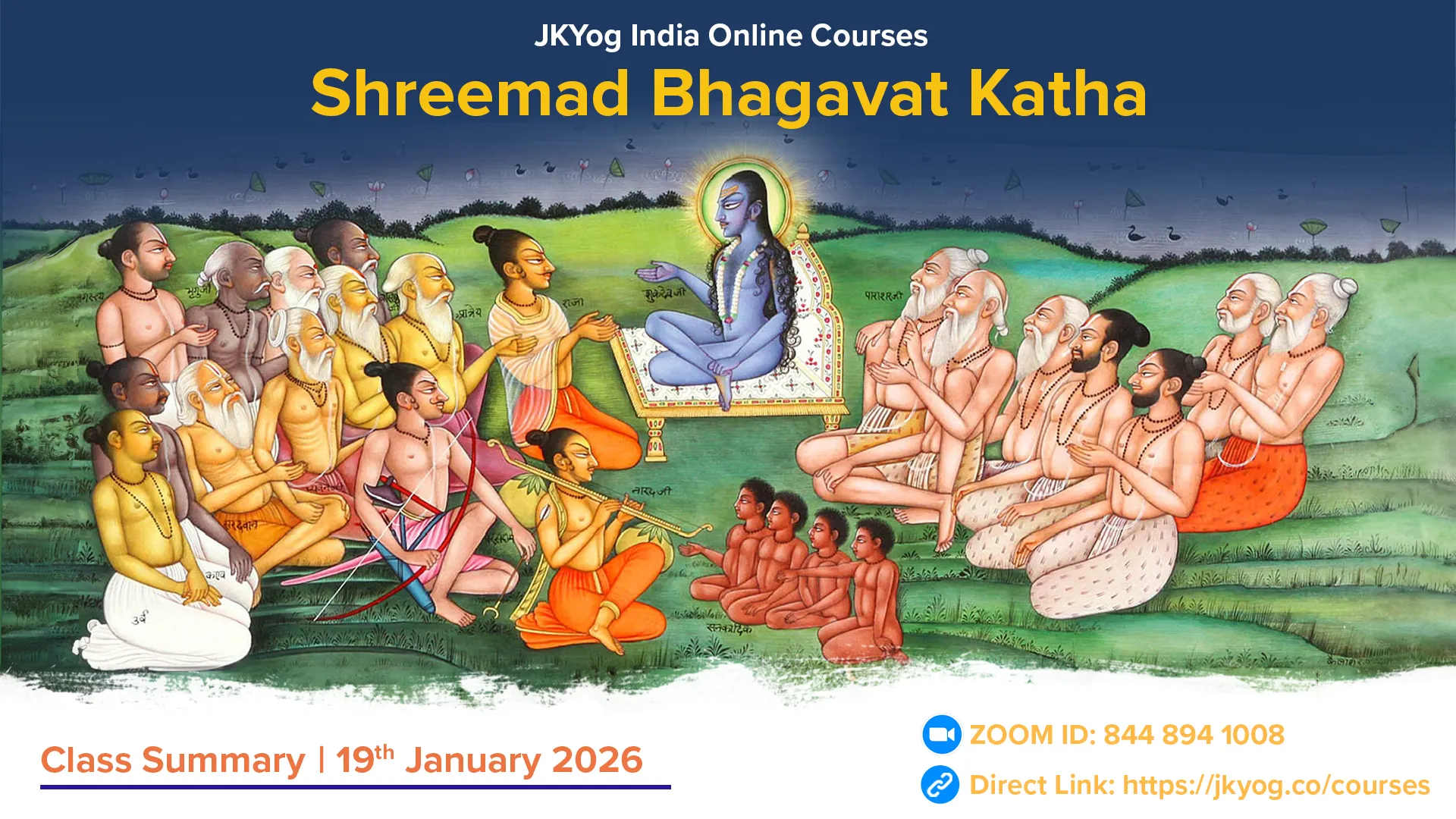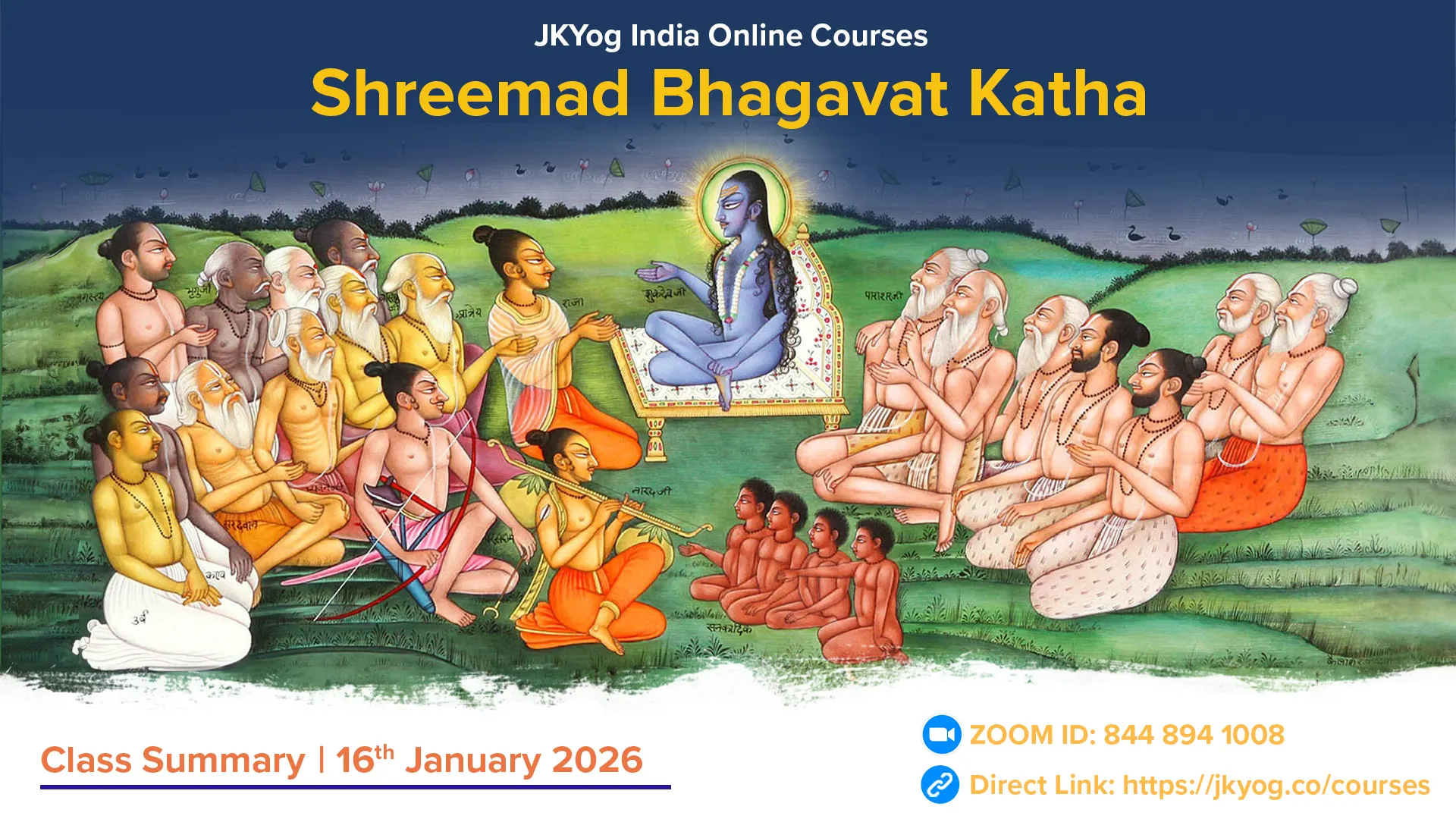Shreemad Bhagavat Mahapuran- Canto: 1, Chapters: 15 to 17
After Bhagwan Shree Krishna departs to His divine abode, Maharaj Yudhishthir cannot overlook the spread of Kaliyug. He sees that greed, falsehood, deceit, and violence are increasing in the country and thus decides to undertake the great journey (Mahaprasthan). He crowns his grandson Parikshit as the king of Hastinapur and Vajra, the son of Aniruddha, in Mathura. After this, Yudhishthir performs the Prajapatya Yajna, renounces the duties of a householder, and takes sanyas. He leaves all his clothes and ornaments there, detached from all attachments and ego; he cuts all bonds. Then he wears a simple cloth, gives up food and water, takes a vow of silence, and lets his hair loose. Without waiting for or listening to anyone, he leaves his home, meditating on Shree Krishna in his heart, and starts his journey towards the north.
Bhim, Arjun, and the other younger brothers of Yudhishthir also see that Kaliyug has now affected everyone on Earth. Therefore, they firmly resolve to attain the lotus feet of Shree Krishna and follow their elder brother. They have achieved all the benefits of life, and, deciding that the lotus feet of Bhagwan Shree Krishna is their supreme goal, they hold Him in their hearts. The devotion to the lotus feet of Shree Krishna arises in the hearts of the Pandavas, and their intellect becomes steadfast in Shree Krishna with exclusive devotion. As a result, they attain a state that can never be achieved by wicked men attached to worldly pleasures. Vidurji also gives up his body in the Prabhas region. At that time, he goes to his own abode (Yamalok) along with the ancestors who come to receive him.
Jag chhodna hi hoga Govind Radhey,
Pehle hi chhodi man Hari mein laga de.
Meaning: One must leave this world eventually (at the time of death), even if we don't wish to. Therefore, why not detach our minds beforehand and focus them on Shree Hari? This way, when the time of death arrives, our minds will not be attached to worldly matters.
Sutaji says, "Shaunakji! After the Pandavas' Mahaprasthan, King Parikshit starts ruling the Earth. He marries Iravati, Uttar's daughter. From her, he has four sons, including Janamejaya. He appoints Kripacharya as his Acharya (royal priest) and performs three Ashwamedha Yajnas on the banks of the Ganga. In these Yajnas, the gods appear in person to receive their share. Shaunakji asks why King Parikshit simply punishes and lets Kaliyug loose during his conquest instead of killing him.
Sutaji continues that when King Parikshit hears that Kaliyug has entered his well-protected kingdom, he takes his bow and sets out for conquest.
On his journey, he meets many kings and hears about the glorious deeds of his ancestors everywhere. The praise of his forefathers consistently reveals the glory of Bhagwan Shree Krishna. He also hears about how Bhagwan Shree Krishna protected him from the blazing Brahmastra of Ashwatthama, the deep love between the Yadavas and the Pandavas, and the devotion of the Pandavas to Bhagwan Shree Krishna. Hearing the stories of his ancestors and Shree Krishna, Parikshit's devotion to the lotus feet of Bhagwan Shree Krishna increases even more. A miraculous event occurs not far from his camp during this time."
Dharma-Prithvi Dialogue
Dharma, taking the form of a bull, is roaming on one leg and finds Prithvi in the form of a cow. Tears are flowing from her eyes, and her body is losing its radiance. Dharma begins to ask Prithvi, "Are you well? Your face appears somewhat discoloured. You seem to be losing your lustre, and it appears there is some sorrow in your heart. Are you worried about me, seeing that three of my legs are broken and only one remains? Perhaps you are lamenting for the Devas, who no longer receive offerings in the yajnas, or for the people suffering from famine due to lack of rain."
Dharma further asks, "Are you grieving for the women and children being tormented by demon-like men? Today's so-called kings are entirely corrupt, having devastated large lands for their selfish motives. Are you mourning for those kings or lands? People now do not follow the scriptural rules regarding food, clothing, bathing, and marital relations; does this sadden you?"
Dharma continues, "Maa Prithivi! Perhaps you are reminiscing about Shree Krishna, who took birth in this world to relieve your burden and performed many divine pastimes. Now, with His departure, you are distressed. Devi, you are a treasure trove of wealth and jewels. Please tell me the reason for your sorrow."
Prithvi responds, "Dharma! You already know everything you are asking me. Bhagawan Shree Krishna, by whose grace you had your four legs intact, has now concluded His pastimes on this Earth. This world has now fallen prey to the sinful influence of Kaliyug. Seeing this, I am greatly distressed. I was adorned with the marks of Bhagawan Shree Krishna's lotus feet, such as the lotus, vajra, ankusha, and flag, and thus, I attained great prosperity and stood out among the three worlds. But now my fortune has ended. Bhagawan has left me, the unfortunate one. It seems that pride in my good fortune has led to this punishment from Him."
Runuka, jhoon, dhun noopur Nandalaal
Jinake charan-kamal nahim aawat, shambhu-samadhihum haal
Unake charan-kamal par raajat, noopur nitya rasaal
Meaning: The verses by Jagadguru Shree Kripaluji Maharaj describe the divine feet of Shree Krishna, which even Bhagwan Shiva cannot fully grasp or comprehend in His meditative state. Krishna's same eternally radiant and blissful lotus feet are adorned with anklets, whose bells create a melodic sound and are always filled with divine nectar.
Dharma and Prithvi are conversing when King Parikshit arrives at the banks of the Saraswati River. Upon reaching there, King Parikshit sees a man dressed as a king, holding a stick, mercilessly beating the cow (Prithvi) and bull (Dharma) as if they have no owner. The white bull stands on one leg, trembling, suffering from the blows, and urinating out of fear. The cow is also extremely distressed, repeatedly being kicked by the man's feet. She is already emaciated, separated from her calf, and hungry, and tears are flowing from her eyes.
King Parikshit strings his bow and, in a voice as deep as thunder, challenges the man, "You are guilty of attacking the innocent in this desolate place after our grandfathers Arjun and Bhagawan Shree Krishna have departed to their supreme abode. You deserve to be punished." He then turns to Dharma and asks, "Despite having only one leg, you are moving around. Seeing this, I feel great sorrow. Please tell me, are you some deity in the form of a bull? The power of the Kuru dynasty kings still protects this entire Earth. I have not seen tears of sorrow in the eyes of any other being. Both of you do not cry; I will punish this wicked one."
The Four Legs of Dharma
Upon being questioned by Parikshit, Dharma responds:
- Some people blame themselves for their suffering.
- Some attribute it to fate, while others to their actions.
- Some believe it is due to their inherent nature, and others hold God responsible.
- Some think the cause of suffering cannot be understood through reason or explained through words.
He then says, "Which of these views is correct? You may judge by your own intellect." Hearing this discourse, Parikshit is very pleased, and his sorrow is alleviated. He calmly says, "O Vrishabhdev, knower of Dharma! You are preaching the principles of Dharma. Surely, you are Dharma incarnate in the form of a bull. You did not name the cause of your suffering because the same hellish punishments that befall the perpetrator of adharma (unrighteousness/ opposite of Dharma) also befall the one who complains about them."
In Satya Yug, Dharma stood firmly on four legs:
- Penance (tapa/ तप)
- Purity (Pavitr̥tā/ पवित्रता)
- Compassion (dayā/ दया)
- Truth (satya/ सत्य)
Due to adharma's influence, three legs (penance, purity, and compassion) have been destroyed by pride, attachment, and intoxication. Only the fourth leg, truth, remains, and even this is under threat by the deceit of Kaliyug.
Parikshit continues, "This cow is none other than Prithvi herself. Bhagawan has relieved her of a great burden, and she has become celebratory with His footprints. Now, she is separated from Him. She is concerned that false kings will exploit her." Parikshit consoles Dharma and Prithvi. He then raises his sword to kill Kaliyug, the embodiment of adharma. Realising that Parikshit intends to kill him, Kaliyug swiftly surrenders and places his head at Parikshit's feet in fear.
Parikshit Grants Kali Yuga Five Places to Stay
King Parikshit is illustrious, compassionate, and a protector of those who seek refuge. When he sees Kaliyug lying at his feet, he does not kill him but, with a smile, says, "Now that you have come to me with folded hands, you need not fear from anyone belonging to the illustrious lineage of Arjun. However, since you are an assistant to adharma, you should not remain in my kingdom at all. The presence of Kaliyug in the bodies of rulers causes an increase in greed, falsehood, theft, wickedness, abandonment of one's duty, poverty, deceit, quarrels, hypocrisy, and other sins. Therefore, you should not stay in this land of Brahmavarta for a moment, for it is the abode of Dharma and truth. In this land, Bhagawan Shree Hari resides in the form of yajnas (sacrifices), receives worship through yajnas, and blesses those who perform yajnas. He, the Supreme Soul, pervades all living beings both within and outside like the air, fulfilling their desires."
Hearing Parikshit's command, Kaliyug trembles. Like Yamaraj, ready to kill, Kaliyug says to Parikshit, standing with a drawn bow and arrow, "Wherever I think of staying according to your command, I see that you are standing with an arrow on your bow. Please tell me where I can stay while adhering to your command."
Abhyarthita-stada tasmai sthanaani kalaye dadau
Dyutam paanam striyah soonaa yatraa-dharmash-chatur-vidhah
Punashcha yaacha-maana-aya jaataroopa-madatprabhu
Tato’nritam madam kaamam rajo vairam cha panchamam
Meaning: "Maharaj Parikshit, thus petitioned by Kali, permits him to reside in places of gambling, drinking, prostitution, and animal slaughter. Kali asks for something more, and because of his begging, the King gives him permission to live where there is gold because wherever there is gold, there is also falsity, intoxication, lust, envy, and enmity." (Bhagavat 1-17-38-39)
Parikshit, thus, grants Kaliyug five places to stay:
- Place of Gambling (Casinos): Where falsehood is prevalent.
- Place of Alcoholism (Bars): Where intoxication or delusion is prevalent.
- Place of Unlawful Association with Women (Brothels): Where lustful desires are prevalent.
- Place of Violence (Slaughterhouses): Where cruelty is prevalent.
- Gold or Wealth (accumulated beyond the requirement for sustenance): Where passion (rajoguna) is prevalent.
In these five places granted by Parikshit, Kaliyug, the root cause of adharma, resides. Therefore, individuals seeking spiritual welfare should avoid these five places. After this, King Parikshit restores the three legs of Dharma—penance, purity, and compassion—and, with assurance, supports the nourishment and flourishing of Prithivi.
Summary: JKYog India Online Class- Shreemad Bhagavat Katha [Hindi]- 22.07.2024

